The Spanish Super Cup is developing quite a cachet. From a contest that used to be regarded as no more than a glorified pre-season friendly, it has grown into an event that etches itself into history.
When Barcelona failed to make the right impact in its new three-match format a year ago, they sacked their then manager, Ernest Valverde. While they were fluffing their lines in the final on Sunday, they dramatically lost their spiritual leader.
The red card shown to Lionel Messi in extra-time of the pulsating 3-2 defeat to Athletic Bilbao ensures that the 2021 Super Cup will be remembered well beyond the Basque Country, where Athletic supporters, watching on television, cherished the deserved capture of the title via victories over Real Madrid, in the semi-final, and then Barcelona.
Athletic will take no extra pride from the fact that they now also have the distinction of having frustrated the greatest footballer of his generation so much that he was sent-off for the first time in a club career of more than 750 games. Athletic do not need that landmark to confirm they were the better side on the night.
Nor did Barcelona manager Ronaldo Koeman need to see Messi raise his arm with the intention of hurting Asier Villalibre – the Athletic striker who had scored the second equaliser of the night and proved enough of an irritant to Messi to provoke what the victim later described as a “clear act of aggression” – to know Messi is exasperated. He has spelled it out enough times in the last 12 months.
The red card will bring with it a suspension for Barcelona’s captain, and reduce the number of his remaining matches for the club he has served throughout his professional life. That number looks more and more finite.
Messi wanted to leave Barca six months ago and is actively exploring new horizons for when his contract expires in June.
He will be banned for between one match and four, depending on how successfully Barcelona lobby the Spanish Football Federation to take into account his clean record in terms of club red cards, and their arguments that Villalibre had fouled Messi in the build up to the incident.
_____________________________________________________________________
Barca player ratings in Super Cup final

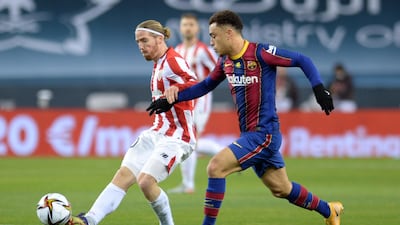

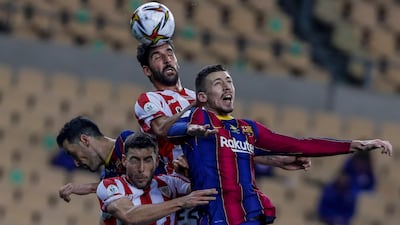
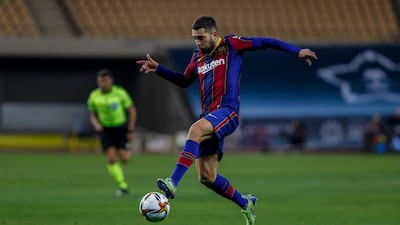
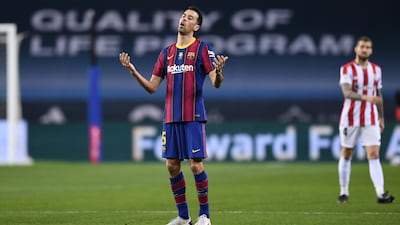



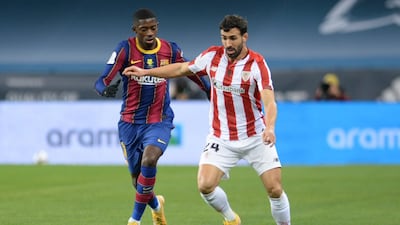




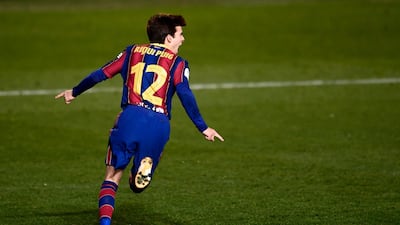

_____________________________________________________________________
What Barcelona can reassure themselves about is Messi’s commitment to their cause for this season at least. His anger that a possible 35th trophy in their colours had slipped from his grasp as the final whistle approached was palpable.
Messi’s fitness to start the final had been touch-and-go, because he was recuperating from a muscle problem through the previous week.
“He knows himself and we spoke before the game,” said Koeman. “He said was in the right condition and he coped very well.” A superb Messi pass led to the opening goal, scored by Antoine Griezmann, who would later put Barcelona 2-1 up with 13 minutes of the 90 remaining.
Villalibre dragged the match into extra-time by meeting a low cross with the referee about to signal the end of normal time.
Bilbao were the more energised team after that, their confidence epitomised by Inaki Williams, who struck the winning goal after neatly stepping away from Griezmann and lofting an angled shot in off the post. “The best goal of my career,” Williams called it.
The goal will be cherished for a long time in the Basque Country, where Williams’s parents, refugees from West Africa, settled in the mid-1990s.
He was born in Bilbao, and grew up attached to Athletic, a club where a sense of belonging is cultivated in a unique way. Athletic only field players with roots, through birth or parentage, in the Basque Country.
That bond with their region defines them. They were in the Super Cup, because they reached the final of last season’s Copa del Rey, a final, against near-neighbours Real Sociedad which is yet to be played because both clubs asked to postpone it.
They want supporters to be able to attend, which has been impossible under the public health conditions in place since the beginning of the coronavirus crisis.
Sunday’s triumph – in an empty stadium in Andalucia – gave Athletic their first trophy since the Super Cup of 2015 and meant the 12th defeat in a final of Messi’s decorated career. The concern for his employers is that it may be the last final he plays in their jersey.
There is still this season’s Copa del Rey, in which Barcelona take on suburban neighbours Cornella in the second round on Thursday, and the Champions League, where they meet Paris Saint-Germain in the last 16 next month. But neither Koeman nor Messi would dare think fragile Barcelona are favourites in either competition.




















